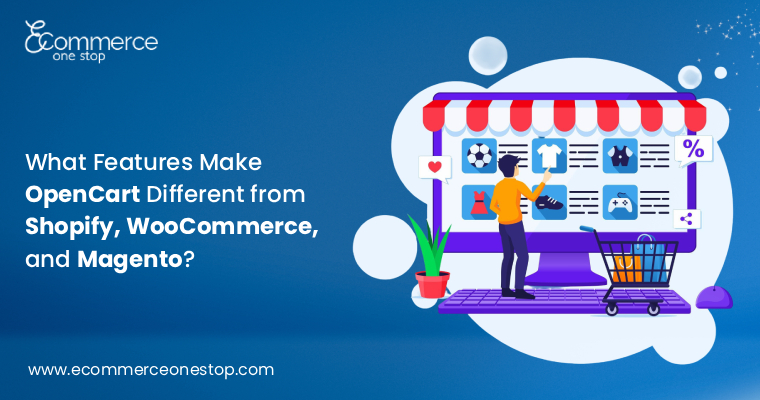In 2025, OpenCart stands out as a free, open-source e-commerce platform that gives you full control over your store. Unlike Shopify’s paid hosting, WooCommerce’s WordPress dependency, or Magento’s heavy setup for large businesses, OpenCart focuses on flexibility and low cost.
Many businesses in the USA
compare OpenCart with Shopify, WooCommerce, and Magento, but OpenCart often wins for small and mid-size stores that want freedom without monthly fees.
If you’re in the USA,
professional OpenCart development services can help customize it to your needs while providing local support.
Get Your Project Started
Book a free consultation with our Ecommerce experts.
Connect Now

What Is OpenCart and How Does It Compare Overall?
OpenCart is a PHP-based system that you download and host on your own server. It is built specifically for online stores, with ready-to-use tools for products, orders, and customer management.
- Shopify: runs everything for you on its servers but requires a monthly subscription.
- WooCommerce: works as a WordPress plugin, which is useful if you already use WordPress.
- Magento: owned by Adobe, is powerful but designed for businesses that handle complex and large operations.
OpenCart’s main advantage lies in ownership; you control the code and can modify it as needed, without being locked into a hosted model like Shopify.
How Does OpenCart Stack Up on Cost?
Cost plays a huge role in platform choice. OpenCart is free to download and install. The only fixed cost is hosting, which usually ranges from 5 to 20 dollars a month, along with any add-ons you choose.
- Shopify starts at 29 dollars per month and increases with advanced plans.
- WooCommerce itself is free, but hosting, themes, and plugins can add to the expense.
- Magento’s community edition is free, but enterprise-level costs can run into thousands each year.
With
e-commerce software revenue at 8.41 billion dollars in 2025 (
Statista), OpenCart helps keep your share of costs manageable. This makes it particularly appealing for startups and small businesses in the USA that need to track every expense.
What Makes OpenCart Unique in Customization?
Customization is one of
OpenCart’s strongest features. With over
13,000 extensions available, you can add new payment methods, shipping options, or marketing tools as needed.
- You can modify themes and modules yourself or hire an expert for OpenCart theme and module development
- Shopify offers apps, but deeper customization is restricted.
- WooCommerce is flexible but tied to the WordPress ecosystem.
- Magento offers endless options but is overwhelming for beginners.
OpenCart also supports multi-store management from a single dashboard, making it easy to expand. From SEO modules to analytics tools, you have the flexibility to adjust your store as trends shift.
How Easy Is OpenCart to Use Compared to the Others?
Ease of use is important, especially if you are new to e-commerce.
- OpenCart has a clean and simple dashboard where you can add products, manage orders, and track sales. The setup process requires some technical steps, like installing on a server
- Shopify is the simplest, offering drag-and-drop tools without hosting concerns.
- WooCommerce feels natural if you already use WordPress.
- Magento has the steepest learning curve and usually requires a dedicated team.
Having an easy-to-manage platform helps you focus on growth instead of technical hurdles. OpenCart development services can also make the setup process smoother.
How Does OpenCart Perform as Stores Grow?
Performance is a key factor in keeping customers satisfied.
- OpenCart is lightweight and runs smoothly even on basic hosting plans. It can handle growth with caching and database optimization.
- Shopify scales automatically but becomes more expensive as you grow.
- WooCommerce works well but can slow down when too many plugins are installed.
- Magento handles large-scale growth well but requires powerful servers.
By
2030, global e-commerce users are projected to reach 4 billion (
Statista), and OpenCart provides affordable growth options. With proper theme and module optimization, it can support thousands of products while maintaining speed.
How Do SEO and Marketing Features Compare?
Search visibility is critical for online stores. OpenCart includes built-in SEO tools like meta tags, keywords, and clean URLs. You can also add extensions for advanced SEO features, sitemaps, and analytics.
- Shopify offers strong SEO apps but many come at a cost.
- WooCommerce, tied to WordPress, is one of the best for content-based SEO.
- Magento has advanced SEO tools but requires expertise to use effectively.
In
North America, e-commerce penetration is at 90.9% in 2025 (
Statista), making SEO and marketing essential. OpenCart makes it easier to run promotions with features like coupon codes, email integration, and social media links—all without heavy investment.
Conclusion
OpenCart provides a balance of flexibility, cost-effectiveness, and ownership that makes it a strong choice compared to
Shopify,
WooCommerce, and
Magento. While Shopify is easy, WooCommerce integrates well with WordPress, and Magento is built for enterprise needs, OpenCart appeals to businesses that want control without large recurring costs.
As e-commerce continues to expand in 2025, OpenCart offers a simple yet powerful way to run online stores.
The right choice depends on your budget, business size, and technical skills; but for many businesses in the USA, OpenCart is the platform that fits when others don’t.
FAQs
1, Which platform is best for a small startup in 2025?
For small startups, WooCommerce is good if you already use WordPress, while Shopify offers quick setup. OpenCart is best if you want cost control and full ownership.
2. How secure is OpenCart compared to others?
OpenCart receives regular updates and has solid security measures, similar to WooCommerce. Shopify manages security for you.
3. Can I migrate my store to OpenCart easily?
Yes, migration tools and extensions make it possible to move from Shopify, WooCommerce, or Magento.
4. What hosting do I need for OpenCart?
Basic shared hosting works for small stores, but VPS is better as your business grows.
5. Is OpenCart good for international sales?
Yes, it supports multiple currencies and languages, making it suitable for cross-border selling.



